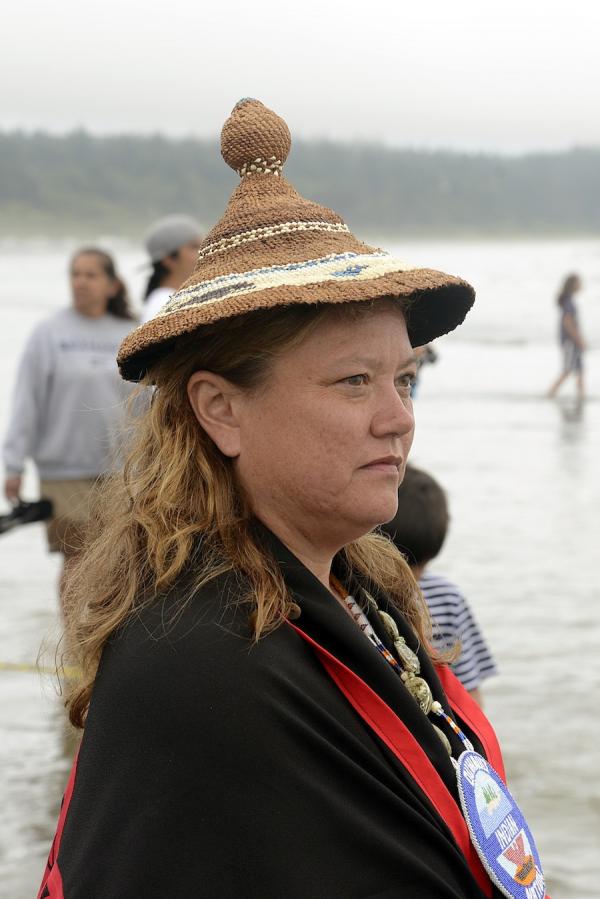 Fawn Sharp, Source: Indian Country Today Media Network
Fawn Sharp, Source: Indian Country Today Media Network
The following are comments by Quinault Indian Nation President Fawn Sharp in advance of today’s 2013 White House Tribal Nations Conference, the fifth of its kind since President Barack Obama took office in a way to improve the government-to-government relationship between federally recognized tribes and the United States government.
Today, President Barack Obama and top officials of his administration are meeting with hundreds of elected chairs, presidents and other key leaders from Indian tribes across the country. It is the fifth annual such gathering, an event promised by the president when he first entered the White House, intended to improve federal/tribal government-to-government relations.
We truly appreciate this opportunity to visit President Obama and listen to his thoughts about the various issues affecting Indian country. But we need much more than a listening session. These annual gatherings do comprise a gesture of good will well beyond any ever made by any president. But we need more than gestures. We need more than progress reports and we need more than promises. Our people are suffering and we need a “paradigm shift,” from the way tribes have been treated by this country in the past to the way they must be treated in the future.
I call upon the president to take a stand—a genuine stand—in favor of a true, democratic, nation-to-nation dialogue regarding the pressures and afflictions facing Indian country today. We need to establish a formalized and permanent intergovernmental framework between the tribes and the United States to, among other objectives, establish agreement on revenue restoration and trust reform through amendment of the self-governance compact.
What this means in layman’s terms is that it’s time for America to wake up to the fact that there are still Indian nations in this country. We haven’t gone away, and we’re not about ready to go anywhere. Our people have been ignored, mistreated, lied to and cheated throughout our history with the United States and the time has come for it to stop.
Indian, Alaskan Native and Hawaiian peoples have endured, and are enduring, the worst possible conditions, from extreme poverty to early death. Our children go to the worst schools. We have the worst health care and we are on the front lines facing the very real impacts of climate change and ocean acidification. The glaciers in our mountains are melting. Our lands and waters are being eroded, poisoned with pollution and displaced by careless development.
Too often, federal agencies ignore our rights and our sovereignty. To name just a few examples:
— Three years after 144 countries passed the United Nations Declaration on the Rights of Indigenous Peoples through the U.N. General Assembly in 2010, President Obama finally decided to sign it—the final country to do so. But even then, the Department of State said the U.S. government didn’t agree with provisions affirming the principle that Indigenous Peoples must directly participate in policies and actions that directly affect their rights and interests. The principle opposed by the U.S. says that indigenous nations have the right to “free, prior and informed consent” before a government’s actions may be carried out. It is a fundamental right of any government. This effectively means the U.S. denies tribes the basic democratic principle that people have a right to know and consent to planned state government policies and actions that affect their livelihood, their social, political, economic and cultural interests and their future survival—a fundamental human right.
— Indians pay as much in taxes as they receive in federal payments under treaties and compacts. So, Indians are paying the U.S. to fulfill its treaty commitments. Also, non-Indian citizens receive approximately 50 times more in return benefit for taxes paid than Indian citizens do. Still, federal appropriations to tribes are being slashed—funds that belong to the tribes and are desperately needed for everything from medical care to education. These are topics for bi-directional dialogue along with implementation of the U.N. Declaration at the World Conference.
We have been supportive of President Obama and his policies, and we hope to continue to do so. But the time has passed when one-sided listening sessions can be counted as true progress in U.S.-tribal affairs. Democratic dialogue between our nations and the U.S. is needed to validate any consent requested of Indians. It’s not happening. Nor will it, until the “intergovernmental framework” to implement the government-to-government policy is formalized.
I challenge President Obama to make his administration a time for real progress for the Indian people—one that will be marked in history as a cornerstone of change, when true intergovernmental dialogue commenced between us and when the tribes finally received some of the respect they deserve.
Read more at http://indiancountrytodaymedianetwork.com//2013/11/13/fawn-sharp-conference-appreciated-we-need-more-152227
